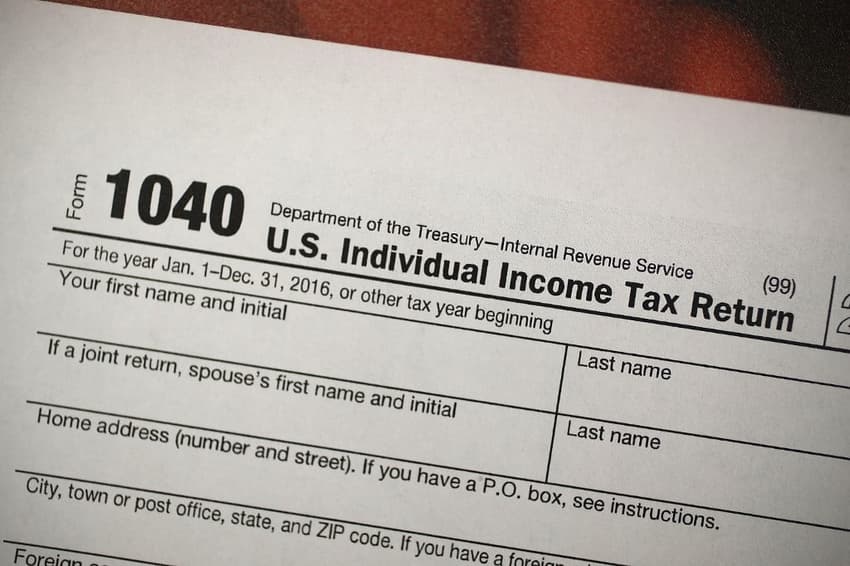Reader question: Do US nationals in Italy have to pay taxes twice?

Understanding tax matters is always challenging, but there are added complications when you live abroad. Here’s a look at the requirements for Americans in Italy.
Question: “I’m planning to move to Italy from the US and I’ve read that I would have to file taxes in both countries. Is this true and will I need to pay income taxes twice?”
Navigating tax-related matters is no walk in the park for anyone, but things are generally even more complicated for people who live outside of their home country. Americans in particular are often concerned about the complexity of the rules they'll need to follow.
You might have heard or read that US nationals living in Italy are required to pay income tax in their country of residence as well as their home country.
And, while, generally speaking, that is a correct statement, the issue needs further unpacking.
Firstly, any US national who is considered an Italian resident for tax purposes (in other words, anyone who is an Italian ‘fiscal resident’ or residente fiscale) has to pay Italian taxes on their worldwide income, that is income generated anywhere in the world.
READ ALSO: What taxes do you need to pay on a second home in Italy?
Under Italian law, you’re considered a tax resident in Italy if, for at least 183 days a year, you:
- Are registered with Italy’s national population registry office (known as Anagrafe) or
- Have your place of residence or habitual residence in Italy
If you don’t meet this criteria, you won’t be considered an Italian tax resident but you’ll still have to pay taxes on any income generated in Italy.
Regardless of which of these two categories you fall in, you’ll have to file and pay taxes in Italy.

Any US national that is considered to be an Italian resident for tax purposes has to pay Italian taxes on their worldwide income. Photo by Scott Graham on Unsplash
At the same time, however, if your gross income is over the required filing threshold, you’ll be required to file a US federal tax return through form 1040 (the deadline for foreign residents is June 15th, though it can be extended to October 15th).
That’s because, in the words of Christine Marciasini, US tax specialist and senior associate at Italian law firm Pirola Pennuto Zei & Associati, “US citizens and green card holders are subject to worldwide income taxation, regardless of where they’ve earned it or where they live".
READ ALSO: MAP: Where do all the Americans live in Italy?
This means that, if you are an Italian tax resident, you’ll be liable for paying worldwide income taxes both in Italy and the US.
However, Italy and the United States have a tax treaty in place aimed at mitigating double taxation. The treaty sets out guidelines which can be used to help determine how different types of income should be taxed, and by which country, as well as providing a framework which allows for the use of various tax exemptions and credits.
There are a number of Internal Revenue Service (IRS) provisions that reduce – and, at times, entirely prevent – double taxation for US nationals living abroad, the main ones being the Foreign Earned Income Exclusion (FEIE) and the Foreign Tax Credit (FTC).
As Marciasini explains, the Foreign Earned Income Exclusion allows you to exclude a certain amount of foreign-earned income (up to 112,000 dollars for 2022) from US taxation, thus reducing your overall taxable income.
On the other hand, the Foreign Tax Credit allows US citizens who have paid income taxes to their foreign country of residence to offset such taxes on a dollar-for-dollar basis, therefore reducing their US tax bill by a dollar for every dollar of foreign income tax that they’ve paid.
Please note that The Local is unable to advise on individual cases. To find out more about the requirements for filing your tax return, seek advice from a qualified professional.
For more information on Italian tax residence, see the Italian Revenue Agency’s website. For more information on IRS provisions available to US nationals living abroad, see the relevant IRS website page.
Do you have a question about living in or travelling to Italy which you’d like to see answered on The Local? Submit it here.
Comments (2)
See Also
Question: “I’m planning to move to Italy from the US and I’ve read that I would have to file taxes in both countries. Is this true and will I need to pay income taxes twice?”
Navigating tax-related matters is no walk in the park for anyone, but things are generally even more complicated for people who live outside of their home country. Americans in particular are often concerned about the complexity of the rules they'll need to follow.
You might have heard or read that US nationals living in Italy are required to pay income tax in their country of residence as well as their home country.
And, while, generally speaking, that is a correct statement, the issue needs further unpacking.
Firstly, any US national who is considered an Italian resident for tax purposes (in other words, anyone who is an Italian ‘fiscal resident’ or residente fiscale) has to pay Italian taxes on their worldwide income, that is income generated anywhere in the world.
READ ALSO: What taxes do you need to pay on a second home in Italy?
Under Italian law, you’re considered a tax resident in Italy if, for at least 183 days a year, you:
- Are registered with Italy’s national population registry office (known as Anagrafe) or
- Have your place of residence or habitual residence in Italy
If you don’t meet this criteria, you won’t be considered an Italian tax resident but you’ll still have to pay taxes on any income generated in Italy.
Regardless of which of these two categories you fall in, you’ll have to file and pay taxes in Italy.

At the same time, however, if your gross income is over the required filing threshold, you’ll be required to file a US federal tax return through form 1040 (the deadline for foreign residents is June 15th, though it can be extended to October 15th).
That’s because, in the words of Christine Marciasini, US tax specialist and senior associate at Italian law firm Pirola Pennuto Zei & Associati, “US citizens and green card holders are subject to worldwide income taxation, regardless of where they’ve earned it or where they live".
READ ALSO: MAP: Where do all the Americans live in Italy?
This means that, if you are an Italian tax resident, you’ll be liable for paying worldwide income taxes both in Italy and the US.
However, Italy and the United States have a tax treaty in place aimed at mitigating double taxation. The treaty sets out guidelines which can be used to help determine how different types of income should be taxed, and by which country, as well as providing a framework which allows for the use of various tax exemptions and credits.
There are a number of Internal Revenue Service (IRS) provisions that reduce – and, at times, entirely prevent – double taxation for US nationals living abroad, the main ones being the Foreign Earned Income Exclusion (FEIE) and the Foreign Tax Credit (FTC).
As Marciasini explains, the Foreign Earned Income Exclusion allows you to exclude a certain amount of foreign-earned income (up to 112,000 dollars for 2022) from US taxation, thus reducing your overall taxable income.
On the other hand, the Foreign Tax Credit allows US citizens who have paid income taxes to their foreign country of residence to offset such taxes on a dollar-for-dollar basis, therefore reducing their US tax bill by a dollar for every dollar of foreign income tax that they’ve paid.
Please note that The Local is unable to advise on individual cases. To find out more about the requirements for filing your tax return, seek advice from a qualified professional.
For more information on Italian tax residence, see the Italian Revenue Agency’s website. For more information on IRS provisions available to US nationals living abroad, see the relevant IRS website page.
Do you have a question about living in or travelling to Italy which you’d like to see answered on The Local? Submit it here.
Join the conversation in our comments section below. Share your own views and experience and if you have a question or suggestion for our journalists then email us at [email protected].
Please keep comments civil, constructive and on topic – and make sure to read our terms of use before getting involved.
Please log in here to leave a comment.